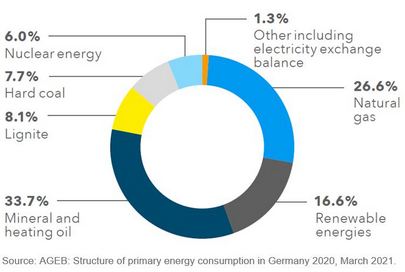As an efficient and the conventional fuel with the lowest carbon content, natural gas is an important component in the context of energy supply. This is particularly evident when looking at the structure of Germany's primary energy consumption. In 2020, the share of natural gas was more than a quarter (26.6 percent) of the total consumption.
In Germany, natural gas is used in various sectors. Industry has the highest demand for natural gas. Last year, industrial natural gas sales amounted to 338 billion kWh, or 36 percent of total demand (939 billion kWh). As an elementary raw material, natural gas can be used in different ways through various processing steps - for example, in the chemical industry. But the energy source is also used in the electricity, heating and mobility sectors. For example, in the heating sector, natural gas was the most used heating energy in 2020. In addition, compared to heat generation from oil or coal, natural gas has the lowest carbon content.
Due to the decision to phase out coal-fired power and nuclear energy in Germany, the energy transition towards more renewable energy must be accelerated, especially in electricity and heat generation. The challenge will be to achieve the goals of climate friendliness, security of supply and affordability at the same time. In this context, natural gas has the potential to play a key role alongside renewable energy sources in the realisation of an intelligent energy mix.
You can get an overview of the advantages of natural gas in our factsheet:
The advantages of natural gas (PDF)

